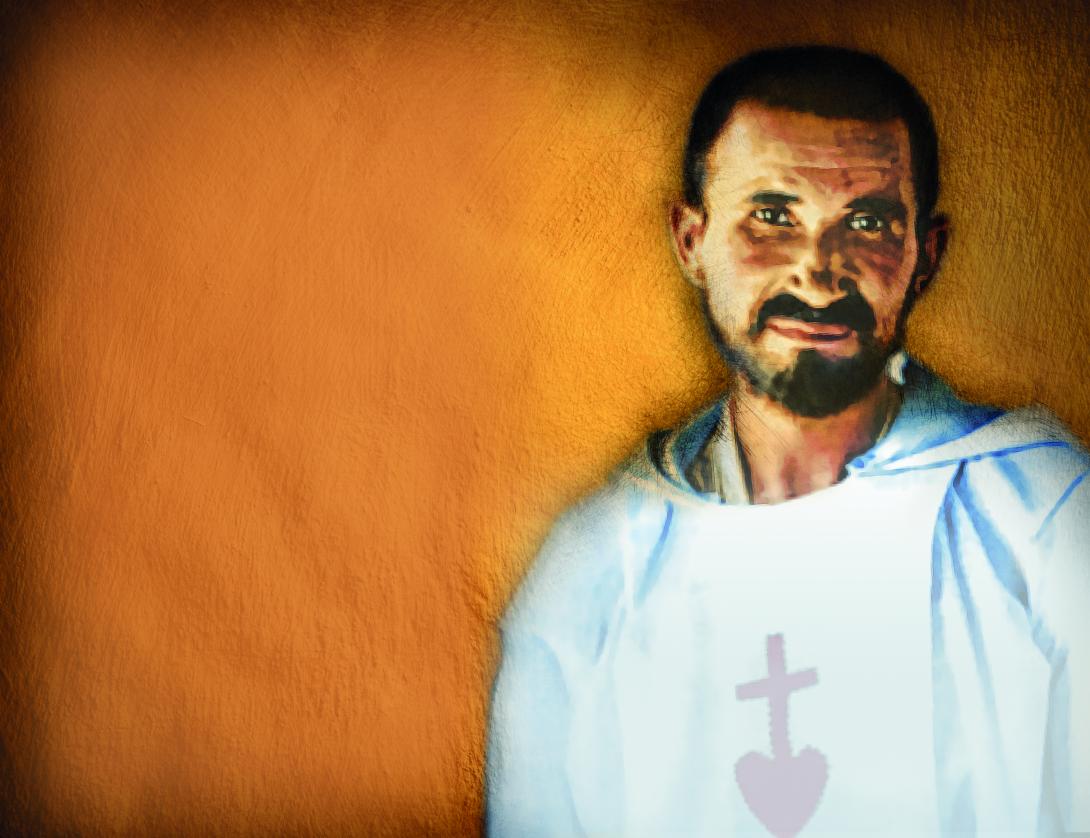He lived out his faith among the Tuareg people in North Africa

From the cover of "The Universal Brother"
By Susanne Janssen
Pope Francis will canonize Blessed Charles de Foucauld, considered to be one of the pioneers of interreligious dialogue, together with six others, during a Canonization Mass in St. Peter’s Basilica on May 15.
Orphaned at the age of six, Charles was brought up by his maternal grandfather, Colonel Beaudet de Morlet. He joined the Saint-Cyr Military Academy. After receiving an inheritance at his grandfather’s death, he could have lived a comfortable life, but signed up for a North African military operation.
At the age of 23, he left the military and undertook a risky exploration of Morocco, which was closed to Europeans at the time, disguising himself as a poor rabbi and traveling with various caravans. The quality of his works earned him a gold medal from the Société de Géographie, as well as fame following a publication of a book.
His trip brought up all the questions and yearnings of his heart as he faced his own vulnerability and witnessed up close the lived faith of Islam.
“As soon as I believed that there was a God, I understood that there was nothing else I could do but to live totally for him,” he wrote. “My religious vocation dates from the same hour as my faith.”
Once back in France, he rekindled his Catholic faith and joined the Cistercian Trappist order in January 1890. Still with the Trappists, he then went to Syria. His quest of an even more radical ideal of poverty, altruism and penitence led him to leave the Trappists in 1897 in order to become a hermit.
Ordained in Viviers in 1901, he decided to settle in the Algerian Sahara at Béni Abbès. His ambition was to form a new congregation, but nobody joined him. He lived with the Berbers, adopting a new apostolic approach, preaching not through sermons, but through his example.
In order to become more familiar with the Tuareg people, he studied their culture for more than 12 years and wrote the first Tuareg–French dictionary.
He collected hundreds of Tuareg poems (paying a few sous to anyone who would bring poems to his hermitage), which he translated into French. Charles de Foucauld’s works remain a reference point for the understanding of Tuareg culture.
On December 1, 1916, Charles de Foucauld was assassinated at his hermitage. He was quickly considered to be a martyr and was the object of veneration following the success of the biography written by René Bazin (1921).
At the heart of Charles’ way of prayer was a deeply Eucharistic spirituality. He saw in the gift of Jesus’ body and blood the sign of God’s abiding presence among us, a love capable of healing and saving our broken humanity, and the image of his own way of presence to others.
“Open the doors and receive all the light. Let the rays of sunshine come in”
Jyoti Patel, British-Indian writer
Charles was killed in the confusion of World War I, having chosen to remain among those in Tamanrasset who were too poor to flee the conflicts in the area. He was well aware of the risk to his own life.
New religious congregations, spiritual families and a renewal of eremitic life are inspired by Charles de Foucauld’s life and writings, the most known the Little Brothers of Jesus, the Little Sisters of Jesus and the Jesu Caritas Fraternity of Priests.
With him, six more blessed individuals will be canonized: Blessed César de Bus (France) was the founder of the orders of the Ursulines of Province and the Fathers of Christian Doctrine (Doctrinarians).
Blessed Luigi Maria Palazzolo, a northern Italian parish priest, dedicated his life to abandoned, orphaned and neglected children. Together with the Venerable Maria Teresa Gabrieli, he founded the Sisters of the Poor, an order that continues to care for and educate girls.
Blessed Giustino Maria Russolillo, a 20th-century Italian priest, is the founder of the Society of Divine Vocations (Vocationists), which encouraged and supported those discerning a call to the priesthood and religious life.
Blessed Maria Francesca di Gesù entered a community of women religious at the beginning of the 20th century and became the superior and formation director of the group, giving life to the Institute of the Capuchin Sisters of Mother Rubatto.
Blessed Maria Domenica Mantovani is the co-founder and first superior general of the order of the Little Sisters of the Holy Family, who can be found in Italy, Switzerland, Albania, as well as in African and Latin American countries.
If you enjoyed this article, you might like...












